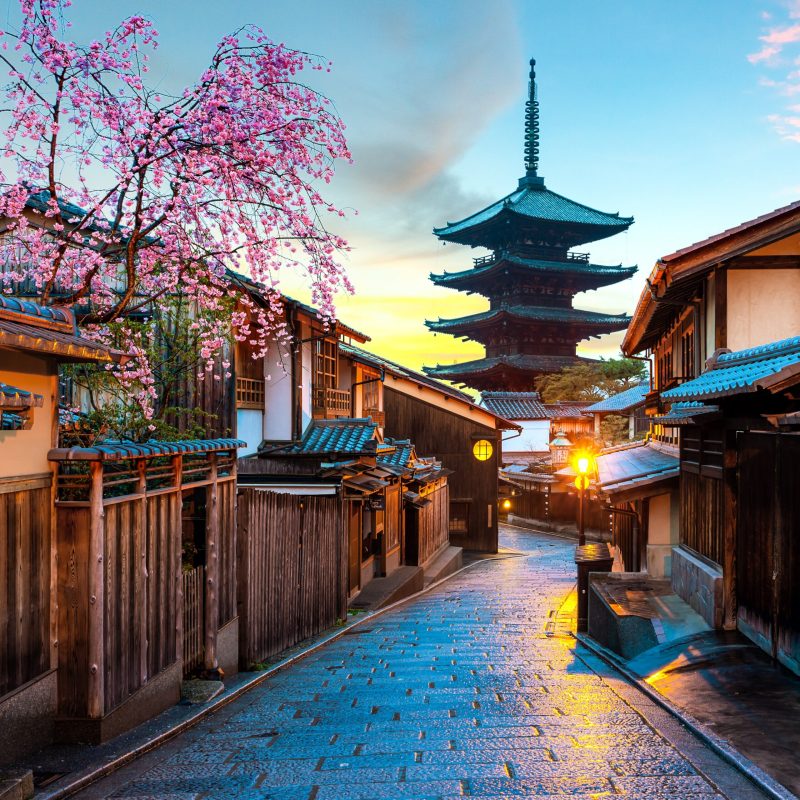
Japan is well known for its rich traditions, world-class cuisine, traditional arts, and unique tea ceremonies. Its history dates back thousands of years, and this is one of the reasons people flock to the country today.
Videos by TravelAwaits
In fact, the country attracted more than 30 million visitors in 2018, a record for the East Asian island nation.
With Japan being a country rooted in tradition, there are some vital cultural customs that are essential to know before visiting, many of which I familiarized myself with before heading there myself for two weeks in September of this year. While the Japanese will recognize that you’re a foreign visitor, it won’t hurt to learn some of their norms and expectations in order to show respect for the Japanese people and their way of life.
Before heading to Japan, be sure to understand the following eight cultural customs. Your knowledge will help you embark on a wonderful journey to this extraordinary nation.

1. Table Manners And Towel Etiquette
If you’re traveling to Japan for the first time, you’ll want to familiarize yourself with the nation’s unspoken table manners. While the Japanese will likely recognize that you’re a tourist and not chastise you for having improper table manners, many will be pleasantly surprised and appreciative when you demonstrate that you’ve taken an interest in their cultural practices.
Before eating any meal, the Japanese will always perform a slight bow of the head and shoulders and say itadakimasu, a phrase that translates to “I receive this food.” My local Japanese tour guide would do this each time before shared meals, and the more I paid attention, the more I noticed this was a common custom in Japanese culture. Similar to the ways in which some Westerners give thanks or say a prayer before a meal, the Japanese typically demonstrate respect for the food they are about to consume.
Another thing to note before heading to Japan is towel etiquette at the dinner table. At most restaurants, you will be offered a warm towel before your meal is served. This towel is meant to clean your hands and then be set gently aside. It is considered rude to use this towel to wipe your face or other parts of your body.
I happened to notice a Western tourist wipe his face with one of these towels in a restaurant at their dinner table one night and saw the server cringe at the sight. While they didn’t say anything to the customer, you could sense the Japanese servers’ distaste. Don’t let this be you!
Want more on Japanese table etiquette? Here’s what to expect when dining at restaurants in Japan.

2. Bowing
It’s a common custom in many Asian countries to perform a bow when saying hello or meeting someone for the first time, but the way in which to bow differs greatly from country to country.
In Japan, bowing at a 30-degree angle with your hands by your sides is common when meeting a friend or acquaintance. Performing a lower, deeper bow demonstrates respect for people of greater importance, or is done when you are apologetic for a mistake you made.
A common mistake many foreigners make when bowing in Japan is only tilting their heads downward. Proper bowing involves bowing with your shoulders and upper body, not just your head. One of my tour guides even corrected my tour group in Tokyo when we all bowed improperly!

3. Shoe Removal
As previously mentioned, bowing is a common practice in many Asian countries, as is removing your shoes in public areas and private homes or accommodations.
In the Buddhist religion (which many Japanese practice), the feet are considered the dirtiest part of the body as they are farthest from the sky (which is associated with enlightenment). For this reason, and for general hygienic reasons, the Japanese remove their shoes at most temples and shrines, in some hotels, and in the home.
While most public spaces or attractions will make it blatantly obvious whether or not you need to remove your shoes (with signs and guidance toward specific shoe-removal areas), if you’re unsure, take a quick glance around to see what other people are doing and, when in doubt, simply ask! Locals will be much more appreciative if you ask whether or not you should remove your shoes, as opposed to assuming and then accidentally offending someone.
While I was in Japan, I always made sure to look for signs for shoe removal when visiting attractions such as shrines, or would look to see if I saw other people doing so. This will help determine whether or not your shoes should stay on or come off.

4. Tipping Standards And Paying In Cash
Although this may feel strange for many Western visitors, tipping is not common in Japan, and can even be considered rude.
While traveling throughout Japan, I quickly learned that the Japanese take an incredible amount of pride in the work that they do. They pay close attention to detail and complete tasks in a particular and precise manner. They believe that what they are doing takes great honor, and it’s what they were put on this earth to do. If you give a tip to any Japanese worker, it can be considered offensive, especially if they truly believe they are doing the job they’re supposed to be doing, and that they don’t need to be awarded extra for it.
Similar to the ways in which the Japanese don’t accept tips, they have a particular way of handling cash. Practically every time I paid for something in Japan, I was given a tray to put my money in and would be given change back in the same tray. This is a common cultural custom in Japan. It can be considered rude to hand cash over by hand, and you’ll most certainly notice this practice when dining out, paying cab fares, or paying entrance fees for attractions.
If you’re not offered a tray to pay for something, it’s considered more polite to hand over any cash or credit cards with both hands instead of one.

5. Smoking In Public
In Japan, there are designated areas to smoke on the street, and smoking outside of these areas is frowned upon.
That said, the Japanese are surprisingly lax when it comes to smoking in restaurants and bars. While many restaurants don’t allow smoking, there are lots of bars in Japan that, unlike establishments in Europe, Australia, and North America, don’t have mandatory smoking bans.

6. Walking Norms
With Japan’s capital being one of the most populous cities in the world — and given that the country has its share of customary ways of doing things — it’s no surprise that there is an art to crossing the street.
Jaywalking in Japan is illegal, and while this is the case in many Western countries as well, Japanese people, including law enforcement, tend to follow this rule more stringently. With so many people commuting on foot in major cities like Tokyo and Kyoto, one must follow street signs and only cross when permissible.
Also, the Japanese drive on the left side of the street and therefore walk on the left side of the street. If you’re walking on the right side of the street, you’ll likely find yourself going against the grain and running into a lot of foot traffic. I learned this the hard way while traveling throughout Japan, and had to consciously commit to walking on the correct side of any two-way sidewalks.
This also rings true with escalators. If you’re on an escalator in Japan, make sure that if you decide to stand, you remain on the left-hand side so people can pass on the right.

7. Tattoos
In Japan, for complex historical reasons, tattoos are associated with the country’s largest organized crime group, the Yakuza. Because of this, tattoos are considered taboo in Japan, and you’re unlikely to find locals flaunting any tattoos in public.
While the Japanese are understanding about other countries and cultures having different tattoo norms, the showing of tattoos in certain public areas, particularly Japan’s famed bath houses or onsens, is discouraged, and in some cases, even prohibited. If you or someone you’re traveling with has tattoos and you plan to visit an onsen, make sure it is tattoo friendly prior to booking and arrival.

8. Conformity
While this cultural norm is less obvious when visiting Japan for a limited amount of time, it will become more apparent to those who spend time with locals and pay close attention to the way in which Japanese people interact with one another.
Japanese culture is rooted in conformity. The country takes pride in embodying communal values and treating everyone equally. Because of this, most people opt to maintain traditions and don’t tend to challenge cultural norms.
While younger generations are starting to break away from this notion of conformity and are leading lives of more autonomy, Japan’s centuries’ old tradition of conforming to societal norms doesn’t seem to be disappearing anytime soon. While this may seem restrictive to some, it’s also one of the forces that’s kept the country’s unique and rich traditions alive.
Going to Japan? You’ll want to check out Tokyo’s best kept secrets: eight underrated spots to visit, plus what to know before you go.

